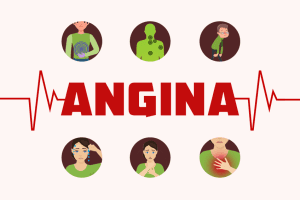

Chest pain known as angina tends to occur intermittently. There are various forms of angina, with stable angina (angina pectoris) being the most prevalent, typically arising from coronary artery disease. Rest and prescribed medications can alleviate angina symptoms, enhancing your overall quality of life. If angina becomes severe or unexpectedly arises, it may indicate a heart attack, necessitating prompt medical attention. Schedule an appointment with Dr. Prakash Chandwani, recognized as the top Interventional Cardiologist in Jaipur.

Angina Treatment in Jaipur
Angina is a cardiovascular condition characterized by chest pain or discomfort resulting from reduced blood flow to the heart muscle. Typically caused by coronary artery disease, angina occurs when the heart muscle doesn’t receive sufficient oxygen-rich blood. This insufficient blood supply often manifests as chest pain, pressure, or a squeezing sensation. There are various types of angina, with stable angina being the most common. It usually occurs during physical exertion or stress and subsides with rest.
Unstable angina, however, can occur unexpectedly and may signal an impending heart attack, requiring immediate medical attention. Managing angina involves lifestyle changes, medications, and, in some cases, medical procedures to improve blood flow to the heart.

Angina Treatment in Jaipur
Angina usually feels like pressure, tightness or squeezing in your chest. This can feel painful or like a dull ache. You might also feel it in your shoulders, arms, neck, jaw, back or stomach.
Other symptoms of angina can include:
There are several types of angina, each with distinct characteristics:
Stable Angina (Angina Pectoris): This is the most common type. It occurs predictably during physical exertion or stress and follows a consistent pattern. Rest or medication typically relieves the discomfort.
Unstable Angina: Unlike stable angina, this type is unpredictable and can occur at rest or with minimal exertion. It is considered more serious and may signal an impending heart attack. Immediate medical attention is required.
Variant Angina (Prinzmetal’s Angina): This rare type occurs at rest and is often caused by a spasm in the coronary arteries, leading to reduced blood flow. It can be severe but is usually temporary and relieved by medication.
Angina is primarily caused by reduced blood flow to the heart muscle, typically due to coronary artery disease (CAD). CAD occurs when the coronary arteries, responsible for supplying oxygen-rich blood to the heart, become narrowed or blocked by a buildup of plaque—a combination of cholesterol, fat, and other substances. The narrowed arteries limit the blood flow to the heart, leading to ischemia (a lack of oxygen).
Triggers for angina symptoms often include physical exertion, stress, or other factors that increase the heart’s demand for oxygen. Understanding and addressing the underlying causes of coronary artery disease, such as adopting a heart-healthy lifestyle, managing risk factors like high blood pressure and cholesterol, and, in some cases, medical interventions, are essential in the prevention and management of angina.
Several factors contribute to the risk of developing angina, including those that directly impact heart health and others that affect the supply of oxygen-rich blood to the heart. While certain risk factors are beyond one’s control, lifestyle modifications and medical interventions can help manage others. It’s crucial to discuss risk reduction strategies with a healthcare provider. Common risk factors for angina include:
Lifestyle Modifications:
Symptoms can be managed with medications like nitrate sprays, patches, and pills. Your doctor may also prescribe medications to lower the risk of a heart attack or stroke.
In some cases, interventions such as coronary angioplasty may be recommended, involving the inflation of a special balloon to widen a narrowed artery. The insertion of a mesh device, known as a stent, can help maintain artery openness.
Additionally, heart bypass surgery may be considered. Embracing simple lifestyle changes is another crucial aspect, aiding in symptom reduction, overall health improvement, and mitigating the risk of future heart attacks.
Choosing Dr. Prakash Chandwani (Interventional Cardiologist in Jaipur) for angina treatment in Jaipur comes with several compelling reasons:
Expertise: Dr. Prakash Chandwani is recognized as a top Interventional Cardiologist, indicating specialized expertise in cardiovascular care and procedures.
Experience: With years of experience in the field, Dr. Chandwani has likely encountered a diverse range of cardiac cases, equipping him with the knowledge to address various complexities.
Proven Track Record: Positive patient outcomes and a history of successful treatments demonstrate Dr. Chandwani’s proficiency in managing cardiac conditions, including angina.
Advanced Procedures: As an Interventional Cardiologist, Dr. Chandwani is likely well-versed in advanced procedures such as angioplasty and stenting, providing minimally invasive options for treating angina.
Patient-Centered Care: Choosing a reputable cardiologist like Dr. Prakash Chandwani often ensures that patients receive individualized attention and care tailored to their specific needs and concerns.
Angina Treatment in Jaipur: Angina is chest pain or discomfort that occurs when the heart muscle doesn’t receive enough oxygen-rich blood. It is often a symptom of underlying heart disease. Distinguishing angina from a heart attack is crucial, as they have similar symptoms but different implications.
Angina symptoms can be triggered by factors such as physical exertion, emotional stress, extreme temperatures, or after a heavy meal. Understanding these triggers is essential for managing and preventing angina episodes.
Diagnosing angina involves a combination of patient history, physical examinations, and diagnostic tests. Common tests include electrocardiograms (ECGs or EKGs), stress tests, echocardiograms, and coronary angiography. Understanding the diagnostic process helps patients prepare and engage in their healthcare.
Adopting a heart-healthy lifestyle is crucial for managing and preventing angina. This may include dietary changes, regular exercise, stress management, and quitting smoking. Patients often benefit from guidance on specific lifestyle modifications tailored to their individual needs.
Understanding the signs of a medical emergency is vital. Patients should be aware of when angina symptoms may indicate a more serious condition, such as a heart attack, and necessitate immediate medical attention. Knowing the appropriate steps to take in an emergency ensures timely and effective intervention.
for book your instant appointment fill below form and get your slot for appointment.